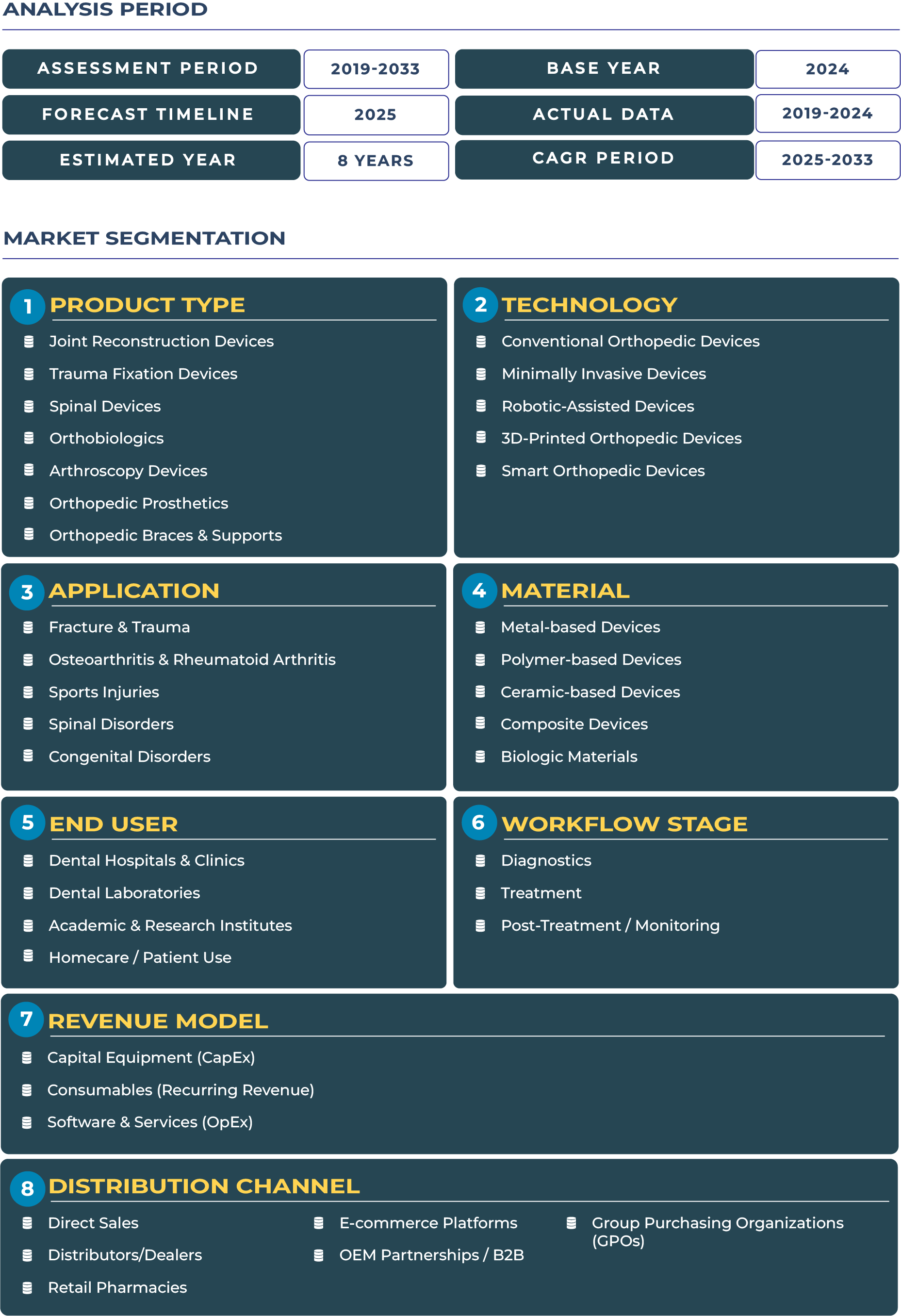Israel Orthopedic Devices Market Outlook: Israel’s Medtech Innovation Ecosystem Powering Orthopedic Devices Growth
Israel has long been recognized as a global leader in medical technology innovation, and this reputation strongly reflects in its orthopedic devices industry. The country’s thriving startup ecosystem, supported by world-class universities, specialist hospitals, and deep-rooted R&D culture, is fueling the rapid growth of orthopedic technologies ranging from joint reconstruction devices to advanced spinal implants and orthobiologics. Beyond serving its relatively small domestic population, Israel orthopedic devices sector is highly export-oriented, positioning the country as a significant contributor to global innovation in the orthopedic devices landscape. Valued at USD 136.8 million in 2025, the Israel orthopedic devices market is projected to reach USD 284.9 million by 2033, advancing at a CAGR of 9.6%. The strong growth trajectory is underpinned by robust clinical research activity, export-driven strategies, and government-backed support for medical technology innovation. Despite geopolitical tensions and regional instability, Israel orthopedic devices ecosystem remains resilient, with global collaborations continuing to strengthen its market outlook.
How Israel’s Innovation-Led Orthopedic Devices Ecosystem is Redefining Global Medtech Exports
The orthopedic devices market in Israel demonstrates a unique dual focus—meeting domestic healthcare demands while serving as an innovation hub for global markets. With an increasing number of musculoskeletal disorders, orthopedic procedures in Israel are supported by advanced centers of excellence in Tel Aviv, Jerusalem, and Haifa, where hospitals and medtech startups collaborate on high-tech implant development. The country orthopedic devices sector is marked by a strong pipeline of minimally invasive arthroscopy devices, customized prosthetics, and biologics designed to accelerate healing. While the local market is modest in size compared to Western Europe or the United States, its influence on the global orthopedic devices industry is disproportionately large. Export partnerships with North America, Europe, and Asia are key to sustaining growth, with Israeli firms frequently out-licensing technologies to multinational device manufacturers.
Innovation and Limitations: Drivers and Restraints Defining Israel orthopedic devices Industry
Israel orthopedic devices market is primarily driven by its high clinical R&D intensity. The country invests significantly in medtech research, with programs facilitated by the Israeli Ministry of Health that encourage collaborative clinical trials and translational research. Export-oriented medtech strategies allow Israeli companies to access larger markets, while specialist centers of orthopedic surgery within leading hospitals, such as those in Tel Aviv Sourasky Medical Center, provide a testing ground for advanced implants and trauma fixation devices. This integration of hospitals, startups, and academia strengthens the orthopedic devices ecosystem and enhances its international competitiveness.
At the same time, growth is hampered by certain structural limitations. Israel’s domestic orthopedic devices market is relatively small, limiting the scale of in-country adoption for high-end devices such as advanced prosthetics. A high cost base, driven by expensive labor and R&D, increases financial pressures on local firms, compelling them to focus heavily on exports. This pressure often diminishes focus on localized healthcare solutions, leaving certain domestic needs under-addressed. Additionally, geopolitical uncertainty and regional security concerns pose risks for supply chain stability and cross-border trade, making the orthopedic devices sector dependent on resilient export relationships and diversified market strategies.
Emerging Trends and Market Opportunities Shaping Israel orthopedic devices Landscape
Israel orthopedic devices industry is strongly influenced by trends in high-tech implant R&D and startup ecosystem integration. The convergence of biotechnology, robotics, and 3D printing is creating advanced orthopedic prosthetics and customizable implants that are globally competitive. Startups in Jerusalem and Tel Aviv are actively collaborating with academic institutions to bring innovation from lab to market. Export collaborations with multinational orthopedic device companies are also on the rise, helping Israeli firms integrate their technologies into global product portfolios.
Key opportunities lie in co-development deals, where Israeli startups partner with global medtech leaders to commercialize breakthrough devices. The country’s clinical trials infrastructure also provides opportunities for international firms to test and validate orthopedic devices in specialized Israeli centers, particularly for biologics and minimally invasive surgical devices. Niche technology exports—such as patient-specific spinal implants and biologic-enhanced bone grafts—position Israel as a leader in specialized orthopedic solutions. These opportunities not only expand global reach but also strengthen Israel’s role as a global orthopedic devices innovation hub.
Competitive Landscape: Global Collaborations and Startup Integration Shaping Israel orthopedic devices Sector
The competitive landscape in Israel orthopedic devices market is characterized by a blend of international medtech leaders and dynamic local startups. Global players such as Johnson & Johnson MedTech and Zimmer Biomet have collaborated with Israeli firms to integrate innovative devices into their product portfolios. Local companies such as Pluristem Therapeutics and smaller orthopedic-focused startups are pioneering biologics and regenerative medicine applications for orthopedic use. Strategies include co-developing advanced devices with local startups, using Israel as a testbed for regional innovation, and launching export-focused devices to maximize global market penetration. Recent partnerships in 2024 highlight strong export-driven initiatives, where Israeli innovations in spinal and trauma fixation devices have been licensed to European and North American orthopedic players. This approach reinforces Israel’s position as both a local market participant and a global orthopedic innovation partner.







